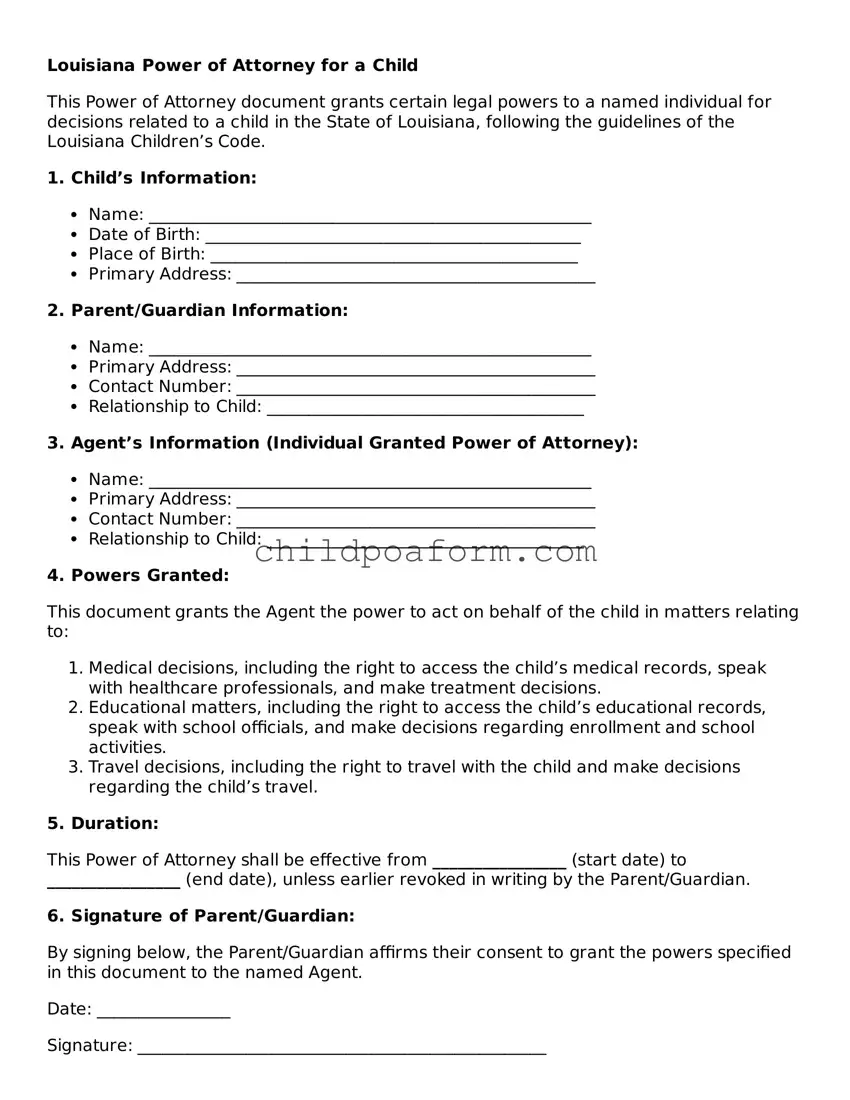Instructions on Utilizing Louisiana Power of Attorney for a Child
After deciding to grant someone else legal authority to make decisions for your child in your absence, the Louisiana Power of Attorney for a Child form is the next step to formalize this arrangement. This document allows a parent or guardian to appoint a trusted individual as an attorney-in-fact to act on the child's behalf under specific circumstances or for a defined period. Completing this form requires careful attention to detail and a clear understanding of the responsibilities you are entrusting to another person. By following these instructions, you can ensure that the document accurately reflects your wishes and complies with state requirements.
- Begin by downloading the latest version of the Louisiana Power of Attorney for a Child form from a reliable source to ensure it's up-to-date.
- Enter the date on which the document is being filled out at the top of the form.
- In the section designated for the principal (the person granting power), fill in your full legal name, address, and relationship to the child.
- Provide the full legal name and address of the person you are appointing as attorney-in-fact in the appropriate fields. Ensure the individual is someone you trust completely.
- List the full legal names, dates of birth, and relationship to you for each child involved in this power of attorney agreement.
- Specify the powers you are granting to the attorney-in-fact. This section may require you to write or select specific decisions the appointed person can make on behalf of the child, such as decisions about medical care, education, or general welfare.
- Determine and clearly state the duration for which the power of attorney will be in effect. If it is for a specific period, provide the start and end dates. For an ongoing arrangement without a set end date, appropriate legal language indicating this must be used.
- If the form requires it, indicate any limitations on the powers granted or any additional powers you wish to specify. This part allows for customization based on your particular circumstances and needs.
- Review the form thoroughly with the appointed attorney-in-fact to ensure all information is accurate, and they understand their responsibilities.
- Sign and date the bottom of the form in the presence of a notary public or any other authorized official, as required by Louisiana law. The attorney-in-factor may also need to sign, depending on the form's instructions.
- Ensure that the form is notarized, if necessary, and keep copies of the completed document for your records and for the appointed attorney-in-fact.
Completing the Louisiana Power of Attorney for a Prisoner form is a straightforward process that bestows significant responsibility on another individual. It's important to communicate openly with the person you're appointing to understand the extent of their duties and to ensure they are prepared to act in the child's best interest. Remember, this legal document can always be revoked or modified as your situation changes or if the needs of your child evolve. Proper completion and notarization of the form protect all parties involved and ensure that the power of attorney is recognized and enforceable under Louisiana state law.
